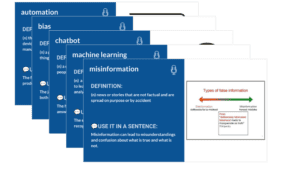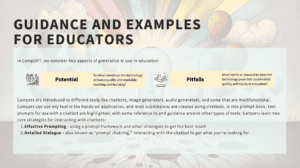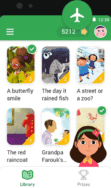AI Literacy: For Everyone, Everywhere
April 15th, 2024 | Blogs
Artificial intelligence (AI) has the potential to make learning more personalized, efficient, and accessible. AI is already all around us and can benefit learners of all ages and in all places. However, like all technology, it has limitations. As learning, work, and life become more infused with AI tools, it’s more important than ever to support AI literacy for all.
This AI Literacy Day, we’re raising awareness of the importance of AI literacy to unlock these benefits – especially for those who already experience barriers to digital access, like adult learners and people living in rural areas. World Education is helping make AI literacy more available for educators and learners so that everyone can be informed, responsible users of AI tools.
Defining frequently used digital terms is the first step to building digital literacy. Our Bridges Digital Skills Framework through the Digital Skills Glossary is a resource for learners and education providers to review digital skills vocabulary and break down digital literacy into easy-to-follow tasks, guided by questions like “Am I able to decide if information is current, accurate, reliable, and relevant?”
 The framework provides a definition of AI – a field of computer science where machines do tasks that usually need human intelligence – and learning goals for understanding AI, including:
The framework provides a definition of AI – a field of computer science where machines do tasks that usually need human intelligence – and learning goals for understanding AI, including:
It’s crucial that educators are aware of how AI impacts learning and are prepared to teach AI literacy so they can safely navigate digital tools and succeed in their careers. This starts with understanding what AI is and what skills one needs to have when encountering it.
For those with consistent internet access and multiple devices, AI is all around. It is used to provide recommendations on TV streaming services like Netflix, recognize faces in mobile phone camera rolls, predict possible next words in a text message, and much more.
Through our CampGPT training, educators came together to learn about existing generative AI tools and how they could support teaching and learning when used intentionally and responsibly. Educators explored how to use chatbots to generate content that is relevant to learners, and to beware of bias in image and audio generators. We’ve published some of this work in an open prompt book with tips, tricks, and prompt ideas, that were developed for educators, by educators.

Our EdTech Center also provides adult educators with the opportunity to earn a Foundations in AI digital badge by learning about AI basics, originality and ownership, use cases in adult education, and ethical implementation through our Generative AI EdTech Bytes webinar series.
Through these participatory initiatives, educators are sharing and gaining knowledge on the use, potential, and pitfalls of AI. For example, in this lightning talk, a teacher of English for speakers of other languages shares how the popular AI chatbot ChatGPT can augment English language learning.
 AI has the potential to enhance and expand access to learning, including in educational contexts where device and internet access are limited. In Ghana, we’ve partnered with Google to test the use of the Read Along app in rural schools where English literacy levels are low among former out-of-school girls. Read Along uses text-to-speech recognition and AI to support reading practice. An online reading buddy, Diya, provides immediate feedback and models pronunciation where needed. The application works offline once downloaded so girls can practice each day. This is an important step in expanding access to the benefits of AI, including accessibility and personalization of learning.
AI has the potential to enhance and expand access to learning, including in educational contexts where device and internet access are limited. In Ghana, we’ve partnered with Google to test the use of the Read Along app in rural schools where English literacy levels are low among former out-of-school girls. Read Along uses text-to-speech recognition and AI to support reading practice. An online reading buddy, Diya, provides immediate feedback and models pronunciation where needed. The application works offline once downloaded so girls can practice each day. This is an important step in expanding access to the benefits of AI, including accessibility and personalization of learning.
World Education is collaborating with partners from Harvard on their innovative AI efforts, in an approach called Artificial Intelligence in Education (AIED) Unplugged, led by Professor Seiji Isotani. Through this, AI is used in Brazil, Mexico, Peru, and the Philippines to support learning recovery and improve students’ writing skills by giving feedback. AI tools are being used in places with limited technology or internet access, showing promise for harnessing the benefits of AI in resource-constrained contexts.
In exploring the questions “What is AI?” and “Where is AI?”, the importance of AI literacy is clear. For many, AI is already used throughout daily life. It can be leveraged to enhance teaching and learning, including for those with limited access to technology. These resources and initiatives are reaching educators and learners where they are and ensuring they have the foundational AI literacy skills they need to thrive.
World Education fosters enduring partnerships across regions and sectors to advance education outcomes for all. We offer education systems strengthening, program design and implementation, applied research and evaluation, capacity development, and policy development services.